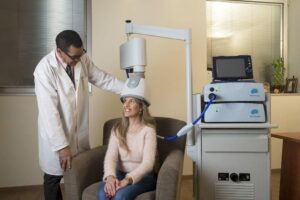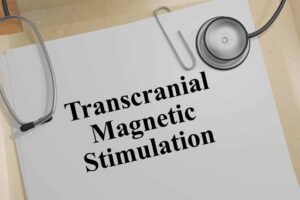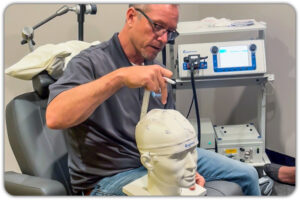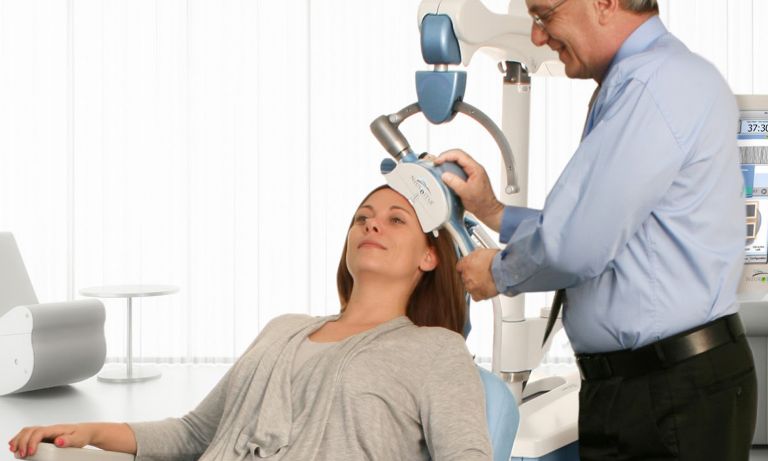Obsessive-compulsive disorder (OCD) is a mental health condition that affects millions of people around the world. It can cause intrusive thoughts and repetitive behaviors, interfering with daily life and preventing people from living their best lives. Fortunately, there are treatments available, such as transcranial magnetic stimulation (TMS), to help manage symptoms of OCD. In this blog post, we’ll discuss what TMS is, how it works, and the potential benefits for those suffering from OCD. We’ll also look at some important considerations to keep in mind when considering whether or not TMS is the right option for you.
Contents
- 1 What is Transcranial Magnetic Stimulation?
- 2 How does Transcranial Magnetic Stimulation Work For OCD?
- 3 Are There Any Side Effects of Transcranial Magnetic Stimulation?
- 4 How Long Does Transcranial Magnetic Stimulation Treatment Last?
- 5 What Are The Success Rates of Transcranial Magnetic Stimulation For OCD?
- 6 Conclusion
What is Transcranial Magnetic Stimulation?

Transcranial magnetic stimulation (TMS) is a treatment for OCD that uses magnetic fields to stimulate nerve cells in the brain. TMS is FDA-approved for the treatment of major depression, and it is effective in treating OCD.
TMS works by delivering magnetic pulses to the brain via a coil placed on the head. These pulses stimulate the nerve cells and can help to improve symptoms of OCD. TMS is usually given five times per week for six weeks.
TMS is a safe and well-tolerated treatment for OCD. The most common side effects are headache and dizziness, which typically resolve within a few days of treatment. This is one of the most promising treatments for OCD and other mental health disorders.
How does Transcranial Magnetic Stimulation Work For OCD?
Transcranial magnetic stimulation (TMS) is a non-invasive procedure that uses magnetic fields to stimulate nerve cells in the brain. TMS is usually used to treat depression, but it is being studied as a possible treatment for OCD.
- OCD is thought to be caused by an imbalance of the brain chemicals serotonin and dopamine. TMS may work for OCD by correcting this imbalance. TMS is thought to increase serotonin levels and decrease dopamine levels. This can help reduce OCD symptoms.
- TMS is typically given 5 times per week for 4-6 weeks. Each session lasts about 30 minutes. During TMS, a magnet is placed against the head near the area of the brain that controls mood. The magnet creates electrical currents that stimulate the brain cells.
- TMS is generally well tolerated. The working of TMS is non-invasive and painless. Reports suggest that there are minimal side effects and most are mild.
Are There Any Side Effects of Transcranial Magnetic Stimulation?

Transcranial magnetic stimulation (TMS) is a noninvasive procedure that uses magnetic fields to stimulate nerve cells in the brain. TMS is currently being studied as a treatment for OCD. While the research on TMS for OCD is still in its early stages, there is some evidence that it may be effective.
However, like any treatment, there are potential side effects of transcranial magnetic stimulation. The most common side effect is headaches. Other potential side effects include :
- Tingling and twitching of the facial muscles
- Lightheadedness or dizziness
- Nausea
- Hearing changes, such as ringing in the ears (tinnitus)
- Jaw pain or muscle tightness
- Uncomfortable sensations in the scalp where the stimulation is applied.
It is important to note that these side effects are usually temporary and do not last for a long time. Talk to your doctor if you experience any of these side effects following a TMS session.
How Long Does Transcranial Magnetic Stimulation Treatment Last?
The length of a transcranial magnetic stimulation (TMS) treatment can vary depending on the individual and the severity of their OCD symptoms. However, most TMS treatments last for around 30-60 minutes per day, with a course of treatment lasting for 4-6 weeks. In some cases, a maintenance schedule of TMS treatments may be recommended to keep OCD symptoms under control.
The lasting of TMS treatment effects can also vary from person to person. For some people, the effects may last for weeks or months after the completion of their course of treatment. However, for others, the effects may only be temporary and further treatments may be needed to maintain symptom control.
Through the working of a process called neuroplasticity, TMS treatments can help to rewire the brain to reduce OCD symptoms. This means that, although the initial effects of TMS treatment may be short-term, if a person continues to receive regular maintenance treatments, the long-term effects can be more lasting.
What Are The Success Rates of Transcranial Magnetic Stimulation For OCD?

As of now, the success rates of transcranial magnetic stimulation (TMS) for treating OCD are not fully known. However, TMS is a promising treatment option, especially when compared to other available treatments. In one study, TMS was found to be more effective than sham TMS in reducing OCD symptoms.
According to reports, TMS yielded a significant improvement in OCD symptom severity in 30-50% of the study participants. In addition, up to 70% of patients experienced some degree of improvement in their symptoms.
Although these results are promising, more research is needed to determine the long-term efficacy and safety of TMS for treating OCD. It is important to consult a healthcare professional before making any treatment decisions.
Conclusion
Transcranial magnetic stimulation (TMS) is an exciting new treatment option for patients with OCD. It offers significant improvements in the symptoms of OCD, with minimal risk of side effects. TMS is relatively painless and can be done on an outpatient basis. The procedure takes less than half an hour and most people experience a reduction in their symptoms within days of having the treatment. So if you are looking for a non-invasive way to treat your OCD, consider talking to your doctor about TMS as an option.
For more information and guidance, please contact MantraCare. OCD is a mental health disorder characterized by obsessions and compulsions. If you have any queries regarding Online OCD Counseling experienced therapists at MantraCare can help: Book a trial OCD therapy session


